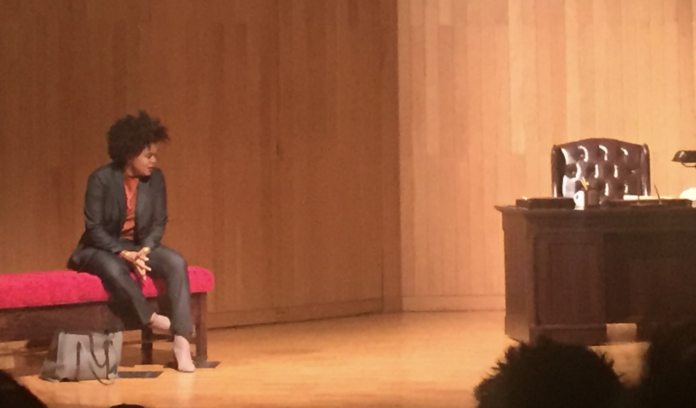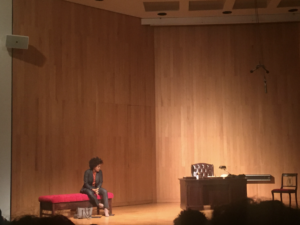

A liberal and a conservative are locked in a law office, or is it a stage?
On Nov. 14, DePauw was happy to invite the Indiana Repertory Theatre (IRT) to its campus and perform the relevant and well received play, “The Originalist.”
Initially opening in Washington D.C in 2015, “The Originalist” studies polarized political figure, Justice Antonin Scalia, and reflects on his views and the thought process behind those views. The play is presented with only one set design and three cast members.
The IRT was brought to DePauw for this one night only performance at the request of DePauw University President, Mark McCoy. “I saw it at the Indianapolis Repertory Theatre and thought ‘that has to come to DePauw,’” President McCoy said. The University organized a confidential contract with the IRT for them to perform at DePauw for one night only.
“The Originalist” follows Scalia and his interactions with the recently hired law clerk, Cat. The conflict is that Cat is, as Justice Scalia puts it, a “flaming liberal.” The two are at each other's’ throats for a lot of the play, understandable considering their views on society are complete opposites.
Through cursing and screaming, the pair find that compromise is not as impossible as it seems. Who can blame them for fighting? Cat is presented as a Harvard Law graduate who identifies as liberal. She has passionate views on equal marriage rights, and gun control. Scalia is an intense, resilient republican who relies on his faith to guide the “set in stone” Constitution — he wants to make this very clear. Scalia wants you all to know the constitution is not fluid.
Characterization is probably the most impactful technique used in the play. Especially with the perfectly executed dynamic between Cat and Scalia. Despite their opposite views, the audience empathizes with both, and part of us wants the two of them to be friends.
There is a sense of exclusiveness in the play, it seems as though this is a side of Scalia that he did not want the public to see: the side of compassion and open mindedness that the seemingly stubborn man didn’t show in public. The two are characterized through a series of small debates, with the battleground being his office, and intellectual warfare commences.
The play tackles very relevant and tough topics such as gun rights (and how they have caused countless innocent deaths) and gay marriage, which is the center topic for the play. As the two characters fight, one can’t help but think that Cat is the voice for liberal America, while Scalia is the conservative view. Cat delivers emotional, heartfelt monologues while Scalia interjects with logical and honest rebuttal.
“The Originalist” provides incredible acting talent from every cast member. The dynamic between the leads, Ayanna Bria Bakari and Henry Woronicz, is so natural that you forget you’re watching a play. Jeb Burris was also comedically convincing as he plays the stereotypical gun loving republican: Brad.
“The Originalist” is an introspective play on the private life of Scalia, and, as a player in the political arena, we see how religion and his experiences impact his life. Especially in this day, it is good for all of us to reflect on how we make decisions and how our viewpoints impact others. Whether that be gun control, or marriage equality, it is our job to be as open minded as possible and to take a chance on the things we don't understand yet. As Justice Scalia put it, “faith takes courage.” And today we need much of both.
